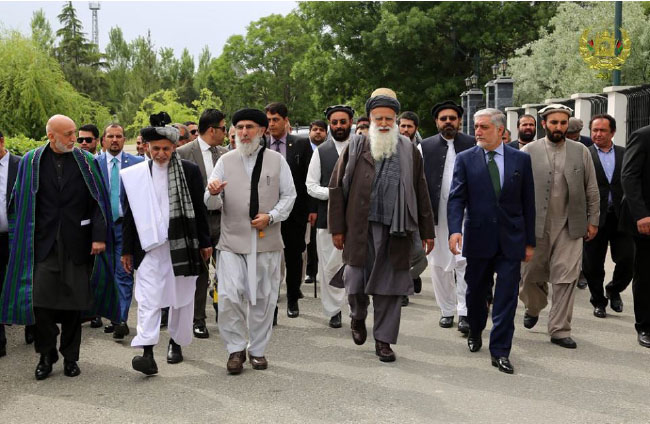Despite peace agreement signed between Afghan government and Hezb-e-Islami Afghanistan (HIA) – mostly known as Hezb-e-Islami Gulbuddin – in September 2016, the insurgency did not decline. After the winter lull, Afghan soldiers sustained great casualties. Violence and militancy have lingered for more than a decade inflicting heavy casualties upon Afghan civilians and soldiers. The Taliban fighters continue their acts of terror regardless of national and international condemnations. The clerics called this war inhuman and against Islam. Calling the Taliban to join peace process, HIA’s leader Gulbuddin Hekmatyar also said in his recent statement that the Taliban’s war had no legitimacy.
Afghan jihadi leaders are backing the post-Taliban government which was established on the basis of democracy. Following the 9/11 attack that led to the fall of the Taliban’s regime, Afghan Loya Jirga (Grand National Assembly) approved a constitution based on Islamic tenets, cultural and democratic values. In this constitution, human rights and dignity are considered inviolable and inalienable and there is no discriminations against Afghans regardless of their race, color and creed. In Loya Jirga, people’s representatives, jihadi leaders, notable clerics and high-ranking officials had active part so as to approve it in accordance with religious tenets, sharia, and Afghanistan’s cultural standard. It is said in article 3, “No law shall contravene the tenets and provisions of the holy religion of Islam in Afghanistan.” Thus, the constitution respect religious sharia and fundamental rights of mankind. The current government has been elected by people’s direct votes although lacked transparency.
The Taliban’s inhuman practices such as killing non-combatants, including women and children, and attacking Muslims in mosques (Muslims’ sacred place) while offering prayer, destroying schools and infrastructures, etc. are supported neither by Islam nor by a sound mind. In other words, the Taliban’s ideology, which allows the cruel practices, is believed to originate from lack of knowledge and men’s megalomania. Nothing is sacred for the Taliban, including the rights, dignity or blood of mankind or holy places or books. Therefore, a high-ranking jihadi leader and cleric Abdul Rab Rasul Syyaf has constantly condemned the Taliban’s war and actions challenging them to hold a discussion in this regard with the presence of media. Nonetheless, the Taliban made abortive attempt to kill him.
In addition, the former jihadi leader Gulbuddin Hekmatyar, who entered Kabul on Thursday, May 4, called the Taliban’s war illegitimate. Hekmatyar, who returned to Afghanistan after 20 years living in exile, urged the Taliban elements to stop violence and bloodshed. Hekmatyar’s men were also involved in militancy against the government and nation. Now he has made peace with the government and seeks to have a share in the government’s body.
Although the peace accord with HIA has not mitigated the militancy, it has been deemed a great outcome for Afghan government after the establishment of High Peace Council (HPC). The Taliban condemned Hekmatyar’s agreement through social media and continue their insurgency.
On the other hand, a number of Afghan people staged a demonstration against Hekmatyar on Friday when he had a speech in a sport stadium in Kabul. The demonstrators were shouting for justice and for Hekmatyar’s trial.
Perhaps the presence of Hekmatyar in the government’s body will led to some political tensions. His political opponents held key positions in the government within the 20 years of Hekmatyar’s absence. Now there are some officials in the state’s apparatus who oppose him indirectly. Similarly, HIA’s leader talk implicitly against his opponents. To think deeply, this agreement is not really an achievement for the HPC, since it cannot reduce the challenges.
It is believed that the Taliban is neither a political party nor a religious group but rebellious fighters who have shed streams of blood and continue to do so. Signing peace with the Taliban will be in conflict with the international law because they were involved in massacres. Nevertheless, there will be no other shorter way to put an end to the protracted war. Following the abortive “war on terror” and withdrawal of foreign forces, the counterinsurgency might not have been as strong as before, for there was lack of military equipment. In brief, the imposed war on Afghanistan was hoped to be ended with imposed peace agreement.
Home » Opinion » Peace Remains Elusive
Peace Remains Elusive
| Hujjatullah Zia

